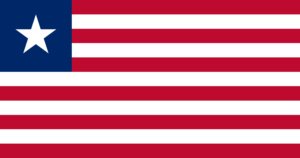The indigenous people of Liberia were indigenous. The Portuguese first came to this country in his 1461 year. They called it Grain Coast. The British then established trading posts on the coast in 1663, but the Dutch destroyed them and no further efforts were made to settle the area.
Liberia, which means “Land of the Free”, was founded in 1820 by slaves and African Americans freed from the United States. The first to arrive were 86 immigrants who established the first settlement at Cristopolis. The city was later renamed Monrovia after President James Monroe. The first president of Liberia was Joseph Jenkins Roberts.
Thousands more freedmen and African Americans migrated to Liberia over the next few years. The Republic of Liberia was declared her independent state on July 26, 1847. The government and constitution were similar to the United States. However, local residents were not allowed to participate and their voting rights remained restricted. A true Whig, he ruled the country and all of Liberia until 1980. On April 12, 1980, local Liberians led by Sergeant Major Samuel K. Du overthrew the government and executed many officials. Since then, violence and riots have been rampant in the country.
| Capital | Monrovia |
| Population | 5,439,587 (Source: 2023 worldometer) |
| Major Cities | Monrovia (capital), Gbarnga, Kakata, Bensonville, Harper, Voinjama, Buchanan, Zwedru, New Yekepa, Greenville |
| Borders | Atlantic Ocean to the southwest, Sierra Leone to the west, Guinea to the north, and Cote d’Ivoire to the east |
| Gross Domestic Product (GDP) | $4,001,047,150 (2022 worldometer) |
| Currency | Liberian dollar (LRD) |

Liberia Major Industries: rubber processing, palm oil processing, timber, diamonds
Liberia Agricultural Products: rubber, coffee, cocoa, rice, cassava (tapioca), palm oil, sugarcane, bananas; sheep, goats; timber
Liberia Natural Resources: iron ore, timber, diamonds, gold, hydropower
Liberia Major Exports: rubber, timber, iron, diamonds, cocoa, coffee
Liberia Major Imports: fuels, chemicals, machinery, transportation equipment, manufactured goods; foodstuffs
Total Size of Liberia: 111,369 km² (source: wikipedia)
Geographical Low Point of Liberia: Atlantic Ocean 0 m
Geographical High Point of Liberia: Mount Wuteve 1,380 m
Climate of Liberia: Tropical; hot, humid; dry winters with hot days and cool to cold nights; wet, cloudy summers with frequent heavy showers
General Terrain of Liberia: mostly flat to rolling coastal plains rising to rolling plateau and low mountains in northeast
World Region or Continent of Liberia: Africa
Geographical Coordinates: 6 30 N, 9 30 W
Liberia Government Type: republic
Liberia Nationality: Liberian(s)
Liberia National Holiday: Independence Day, 26 July (1847)
Liberia Independence: 26 July 1847
Liberia National Symbol: white star
Liberia National Anthem or Song: All Hail, Liberia Hail!
Liberia Languages Spoken: English 20% (official), some 20 ethnic group languages, of which a few can be written and are used in correspondence
Liberia Religions: indigenous beliefs 40%, Christian 40%, Muslim 20%
Liberia is home to more than 20 different ethnic groups, each with their own traditions and customs. The largest group of these are the Kpelle people, who make up about 20% of Liberia’s population. Other major ethnic groups include the Bassa, Gio and Mano.
English is the official language of Liberia, but many Liberians also speak one or more of the country’s native languages. These languages include Kpelle, Bassa, Gio and Mano.
Football is the most popular sport in Liberia and the country has produced a number of notable footballers, including George Weah, who became president of Liberia in 2018. Popular pastimes Other in Liberia include music, dance and storytelling.
Liberia is a presidential representative democratic republic in which the president is both head of state and head of government. The legislative branch of the country is made up of the Senate and the House of Representatives.
Liberia’s economy is heavily dependent on natural resources, including rubber, timber, and minerals such as iron ore and diamonds. The country has struggled with poverty and inequality, but has made progress in recent years thanks to increased foreign investment and economic reforms.
Liberia is a member of several international organizations, including the United Nations and the African Union. The country has also received substantial foreign aid and assistance from countries such as the United States, China and the European Union.
The first European to visit what would become Liberia was the Portuguese sailor Pedro de Sintra, who reached the coast of Liberia in 1461.
The area was known to Europeans as Côte des Grains or Côte du Poivre because the valuable Melegueta pepper was the main commercial commodity in the region.
From 1989 to 2003, a brutal civil war killed 250,000 people, while thousands more were maimed and raped, often by armies of drugged children led by warlords.
In 2012, former Liberian leader Charles Taylor was convicted of war crimes and sentenced to 50 years in prison. His crimes include terrorism, rape, murder and the use of child soldiers by rebel groups in Sierra Leone.
Ellen Johnson Sirleaf of Liberia is the first female head of state to be elected head of state of an African country. She served as the President of Liberia from 2006 to 2018.
Liberia’s name comes from the Latin word “liber” meaning “free”, because the country was founded as a home for freed African-American slaves.
Liberia is one of 27 countries without a UNESCO World Heritage Site. However, it has two properties in the expected list

